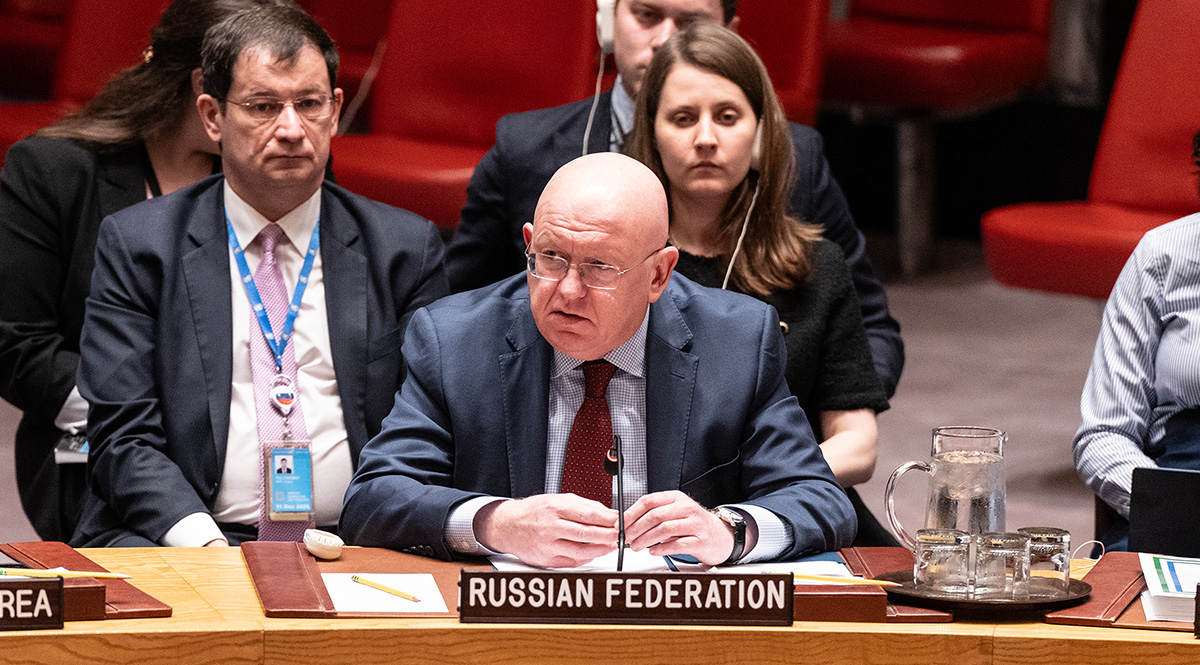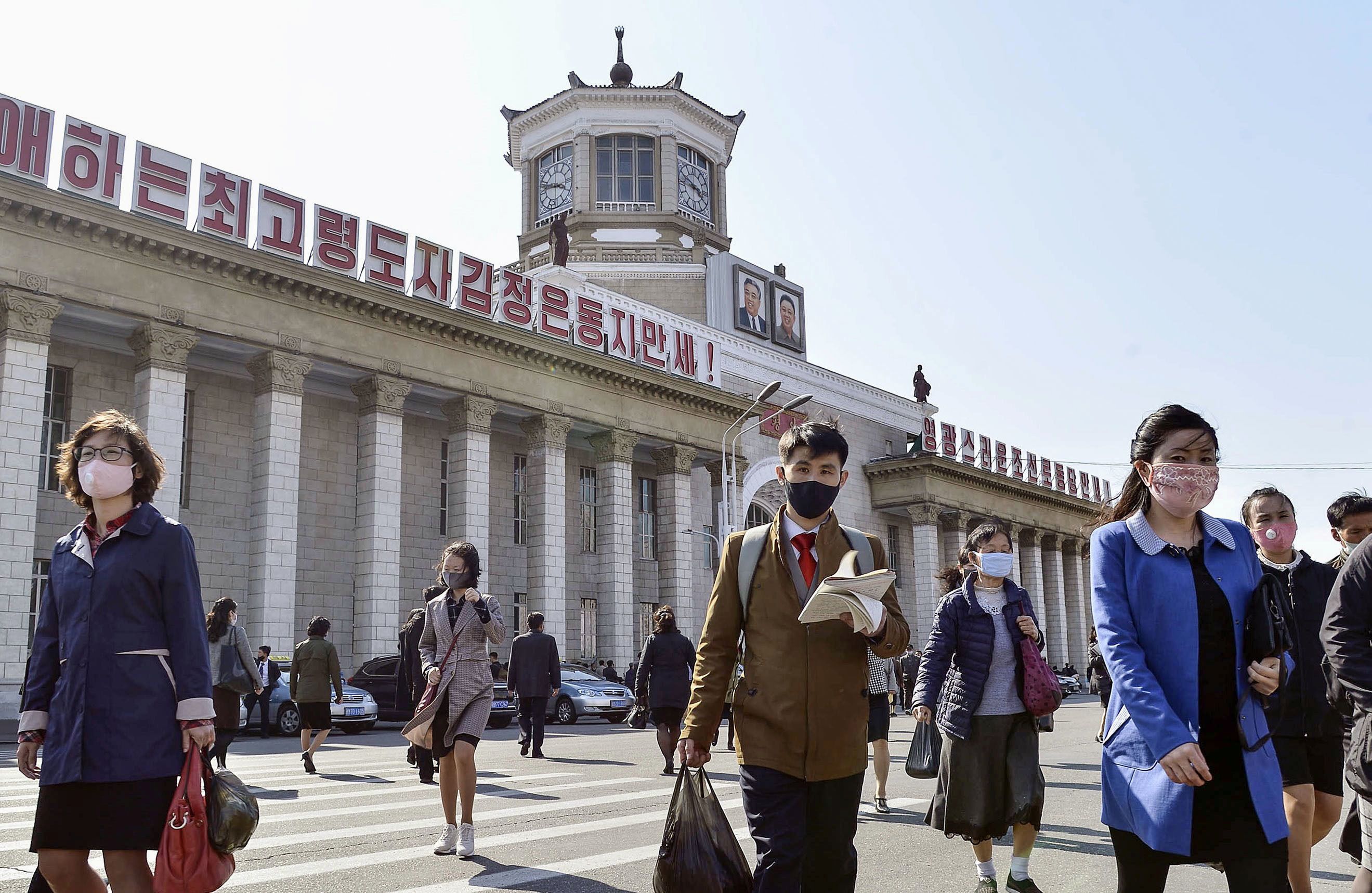Sanctions Regime on North Korea Weakens Further
As a result of Russia’s veto in the United Nations Security Council, the Panel of Experts monitoring the implementation of sanctions on North Korea ceased to operate at the end of April this year. This is another sign of the weakening of UN sanctions on North Korea and a severe blow to international efforts to curb the development of the regime’s nuclear and missile arsenal. The U.S., its allies, and partners face the task of developing new mechanisms to monitor sanctions, most likely outside the UN system.
 Lev Radin / Zuma Press / Forum
Lev Radin / Zuma Press / Forum
Between 2006 and 2017, the United Nations Security Council (UNSC) unanimously adopted nine resolutions imposing restrictions on North Korea in response to the development of its nuclear and missile arsenal. The sanctions primarily aimed to push North Korea into denuclearisation talks. Since 2019, following the failure of then President Donald Trump’s talks with North Korean leader Kim Jong Un, there has been a growing dispute between the permanent members of the UNSC over sanctions on the North. Russia and China suggested easing them, while the U.S., the U.K., and France advocated tightening them. In 2022, for the first time, China and Russia vetoed a U.S. draft resolution to impose further restrictions on North Korea. These tensions reflected negatively on the sanctions monitoring mechanism, eventually leading to its dismantling. On 28 March, Russia vetoed the UNSC resolution to extend the UN Panel of Experts’ mandate to monitor the UN sanctions regime on North Korea (China abstained).
Role of the Panel of Experts
The Panel was established in 2009 under UNSC Resolution 1874 to assist the UN Committee in implementing sanctions on North Korea (the Committee was established by Resolution 1718 of 2006). The Panel comprised eight independent experts appointed by the Secretary General in consultation with the Committee for terms of one to five years. In each iteration, the Panel was composed of experts from UNSC member states, South Korea, and Japan. They specialised in weapons of mass destruction, conventional and missile weapons, arms control and non-proliferation, finance, and air and maritime transport. Their task was to collect information and analyse non-compliance with sanctions on North Korea.
Twice a year, the Panel published reports on the status of the implementation of restrictions, ways North Korea was circumventing sanctions, and the development of its nuclear and missile programmes. The reports also included recommendations to the UNSC, the Committee, and UN member states on tightening the sanctions regime. By 2017, the Panel’s recommendations were helping to formulate further sanctions packages on North Korea. Over the years, state and private institutions have used the Panel’s reports to align regulations with the resolution’s requirements. In particular, the private sector (banks, insurance companies) used information on companies and individuals involved in circumventing sanctions to, for example, freeze their assets. The shortcomings in implementing the sanctions pointed out in the reports were also a form of political pressure on non-compliant states.
UN members were obliged to provide the Committee and the Panel with all information on implementing sanctions. However, only a few dozen countries reported regularly. After 2017, the Committee took no action to improve the implementation of sanctions. This was due first to the opening of the U.S. to dialogue with North Korea and then to increasing tensions between the U.S. and China. In addition, especially after 2019, Chinese and Russian members of the Panel have questioned material presented by other experts, indicating non-compliance with the resolution by China and Russia. These countries have also limited the Panel’s funding and imposed administrative restrictions on the experts, making it difficult for them to conduct investigations on Chinese or Russian territory.
The Significance of the Russian Veto
Terminating the Panel of Experts means that the sanctions regime on North Korea has been deprived of its monitoring mechanism. While sanctions remain binding and countries are still obliged to send reports to the Committee, it will be impossible to impartially and independently verify the degree of enforcement of restrictions. China, Russia, and other countries not complying with resolutions on North Korea will be undermining the credibility of material sent to the Committee indicating deficiencies in implementing sanctions.
Countries circumventing sanctions on North Korea will, in effect, be able to disregard UN-imposed restrictions. This will concern Russia and China in particular, as well as Middle Eastern and African states buying arms from the North. Less implementation of sanctions on North Korea will increase its sense of impunity and make it easier for the country to intensify work on its nuclear and missile programmes. States and non-governmental actors using the Panel’s reports will be deprived of access to comprehensive studies on the status of sanctions compliance. This will make it difficult to modify the means of their implementation to accommodate North Korean techniques for circumventing restrictions.
The end of the Panel’s existence is a severe blow to the UN sanctions regime on North Korea. The Russian veto highlights the lack of consensus among the permanent members of the UNSC on the North. It also reflects the Council’s inability to respond to threats to international security, such as the proliferation of weapons of mass destruction. The non-renewal of the Panel’s mandate even suggests that preventing proliferation is no longer a common interest among the permanent members of the UNSC.
Russia’s veto demonstrates its determination to support North Korea in exchange for the ammunition and armaments it supplies to the Russian war effort in Ukraine. This is a serious violation of UNSC resolutions, so Russia was keen to terminate the Panel, if only for this reason. In addition, Russia is undermining the sanctions regime by hosting North Korean workers and exporting oil to North Korea beyond the limits set by the resolutions. It may also be willing to supply the North with military technology. By using its veto power in the UNSC, Russia is undermining the UN sanctions regime, which has been an essential tool in the policy of the U.S. and its allies towards North Korea for years.
Possible Actions
Faced with the limitations of the UN sanctions regime, the U.S., its allies, and partners will intensify the imposition of autonomous sanctions on North Korea (unilateral, multilateral within a coalition of the willing, and with the EU) and secondary sanctions on states cooperating with the North. They will also enhance cooperation on intelligence-sharing and non-proliferation. Closer coordination is needed to combat cyber threats and enhance resilience to them. The activity of hackers working for the North Korean regime is the most effective way for the country to circumvent sanctions. According to the Panel’s latest report, between 2017 and 2023, North Korean hackers stole $3 billion worth of cryptocurrencies, among other things. It will also be a challenge to combat disinformation from China and Russia, which, while questioning the legitimacy of sanctions on North Korea, will urge other countries not to comply. It will be essential to highlight the threats posed by the North on developing countries, which have been victims of North Korean cyberattacks for years.
Countries supporting the maintenance of the sanctions regime on North Korea are facing the task of setting up a new sanctions monitoring mechanism. While there have been proposals to set up a panel in the UN General Assembly, this idea would probably not be supported by the majority of members, including many countries that have not yet reported on the implementation of sanctions. Therefore, it seems more likely that a coalition of willing states would form an initiative outside the UN, such as the Proliferation Security Initiative established in 2003 to prevent the proliferation of weapons of mass destruction.
While creating a mechanism outside the UN could be helpful, it would also involve many complications. It would be vulnerable to accusations of bias and lack the legitimacy of a UN body. The new mechanism would, therefore, have no legal authority to obtain information from UN member states. Setting up a panel of reliable experts with an adequate budget and administrative, technical, and legal support would also be problematic and costly. The existence of the panel in its new form would also not solve the fundamental problem of putting credible pressure on North Korea, which depends on Russia’s and China’s cooperation in implementing sanctions.
Poland has consistently complied with UNSC resolutions on North Korea and enforces EU sanctions. From 2018 to 2019, it was vice-chair of the UN Committee on implementing sanctions on the North. In addition to the exchange of experience in implementing restrictions, Poland can develop cooperation with interested countries in combating cyber threats, including in the format of NATO exercises with Japan and South Korea. Increased collaboration between European and Asian analytical institutions in monitoring North Korean-Russian contacts is also worth considering.





.jpg)